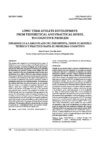Abstract
Two decades after designing and implementing the course of Children’s sport as a university subject at the Faculty of Sports and Physical Education, University of Belgrade, and its full academic and practical affirmation, the question of revising and expanding the theoretical and practical context of this subject has been raised, especially in the area of knowledge-related to long-term development of an athlete (DRS) and career planning (problem of this paper). Therefore, theoretical and practical models related to DRS have been introduced as the subject of this analysis, and as a function of theoretical and practical verification, related to defining the context of a new cognitive problem. If we summarize the extensive theoretical and practical sources, we can conclude that sport theory is not capable to creating a framework for a realistic, much less a long-term athlete development model, which is why the aim of this paper is to set out the theoretical and empirical trends towards a new paradigm for holistic view of DRS through sport. An essential and thorough analysis of the context of a representative model of long-term development of an athlete, known by its English acronym “LATD and other DRS models ascertained that their starting point should be established around the concept of “physical literacy”, as well as that the truth of the DRS model is still in the process of theoretical and practical verification. The discussion offered is a framework for new strides in approach to a comprehensive theory and practice of sport, especially in the area of children’s and youth sport.



Responses